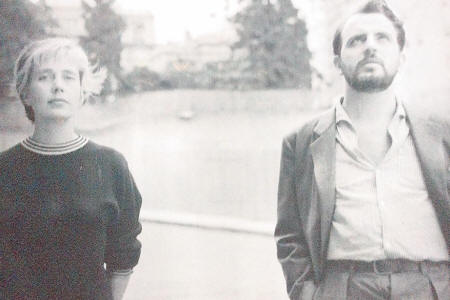

Partner Claudina Marek
Queer Places:
Plaza General San Martín, Maipú 1210, C1006 CABA, Argentina
 Ilse Fusková Kornreich (born 11 June 1929) is an Argentine activist, lesbian-feminist,[1] and journalist.
Fuskova was the first woman who came out and openly declared that she was a lesbian on Argentine television. This occurred in 1991, when TV host Mirtha Legrand invited Fuskova to participate in one of her televised lunches. It was said to be the most watched show of the year.[2]
Ilse Fusková Kornreich (born 11 June 1929) is an Argentine activist, lesbian-feminist,[1] and journalist.
Fuskova was the first woman who came out and openly declared that she was a lesbian on Argentine television. This occurred in 1991, when TV host Mirtha Legrand invited Fuskova to participate in one of her televised lunches. It was said to be the most watched show of the year.[2]
On the arm of her friend Alberto Greco, a young Ilse Fuskova walked the streets portraying members of the more or less unstable intellectual cast of Buenos Aires in the 1950s. Felka's curiosity is an opportunity to encounter a little-known facet of one of the emblems of Argentine lesbian activism and the sepia germ of her passion for yire and freedom.
In the mid-1940s commercial aviation began to expand, the aircraft were propeller planes and Ilse got her first job at Scandinavian Airlines. The key was for her to speak languages. They never tired of telling her that it was, in German, her native language, a neue frau (modern woman). The first salaries allowed her to buy a camera and venture into photojournalism and tour the bohemian arm of Alberto Greco.
According to María Laura Rosa, friend of Ilse, curator and feminist historian and fundamental of Argentine art: The Ilse of the 1950s has a look of rescuing women from cultural circuits within the framework of a society that had just released the female vote (1949). Very few begin to be able to walk the streets alone without suspicion. She was hanging out with a gay man, Greco. She needed that company to circulate in the public space more freely. I don't think it lent itself to confusion, nor that Greco has ever been in the closet. Even so, it was not the same as a single woman walking down Corrientes Avenue. My hypothesis is that Greco allowed her to circulate in places and experiences that she would not have accessed otherwise. They met in Plaza San Martín and started going for a walk. Greco introduced her to her later husband.

Felka and Greco in the Passage
Fuskova was married; she has three children. In 1984, she separated and in the following year, began a lesbian-feminist movement. She was co-editor of Cuadernos de Existencia Lesbiana (Journal of the Lesbian Existence) with Adriana Carrasco, the first issue released 8 March 1987. In the mid-1980s, Fusková was part of the Imagema group founded by Horacio Coppola and Juan José Guttero. In 1992 she joined Gays por los Derechos Civiles, and, with Carlos Jáuregui, and together they organised the first LGBT Pride march in Buenos Aires. She had recognized herself as a lesbian at the age of fifty, and shared her lesbian activism with her partner Claudina Marek, with whom she wrote the book Amor de mujeres. El lesbianismo en la Argentina, hoy (1994), a dialogue with Silvia Schmid. This book, published during a period of social and political upheaval, is testament to what it means to be a lesbian in Argentina today, amidst a struggle for acceptance and sexual liberation. Over the following decades, she has continued attending feminist meetings and publishing articles and books to popularise her ideas and encourage activism.
Fuskova was honored at the "Primer Encuentro Nacional de Mujeres Lesbianas y Bisexuales de Rosario" (First National Women's Lesbian and Bisexual of Rosario) in 2008. In recent years, she also focuses on environmentalism and is in a relationship with a gay man. In 2015, she was declared Citizen of the City of Buenos Aires by the Buenos Aires Legislature.[3]
My published books: